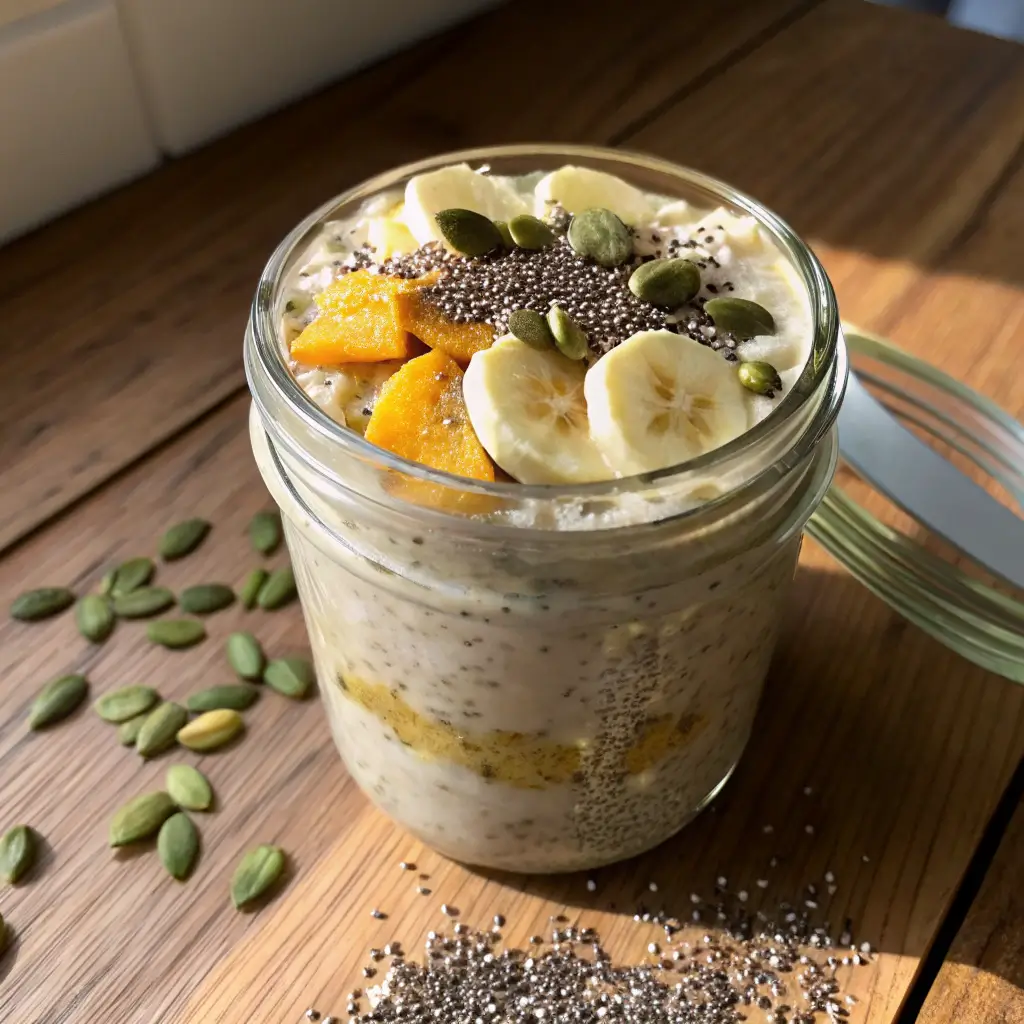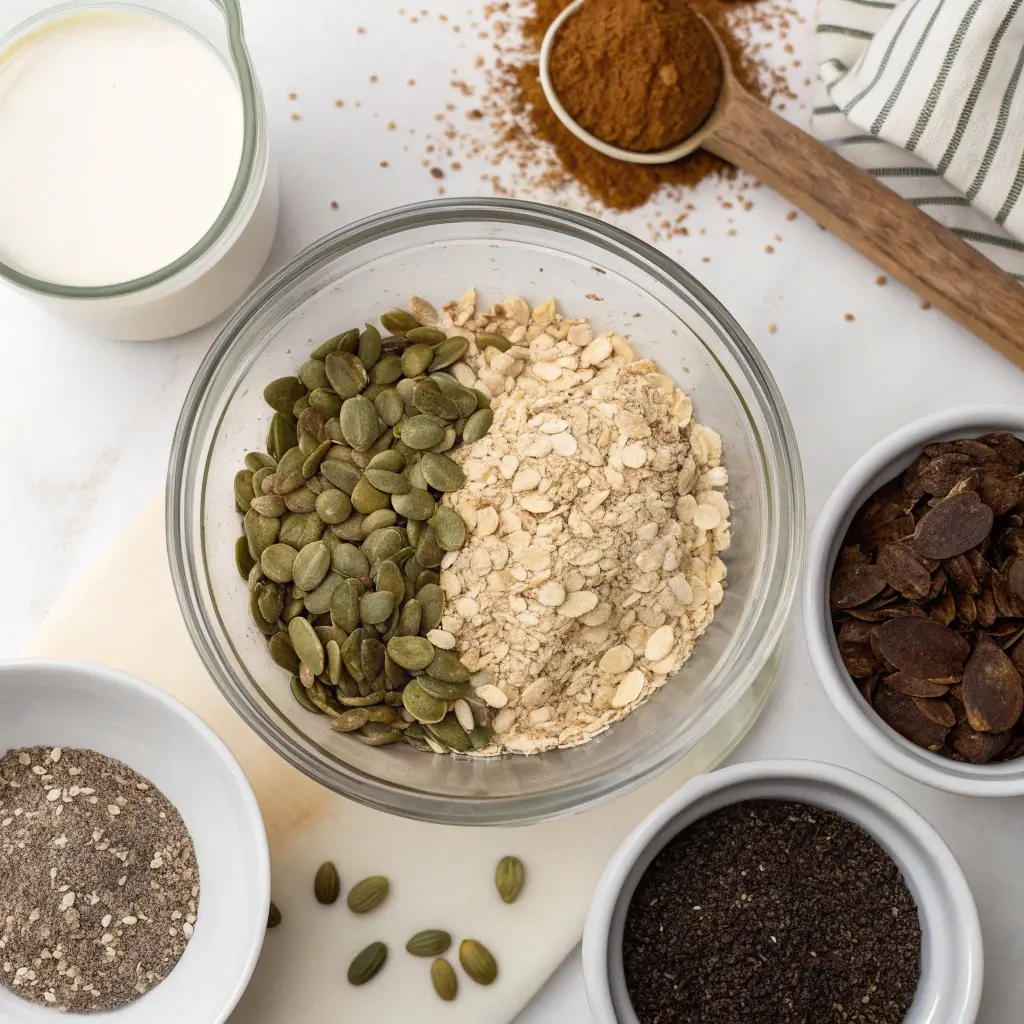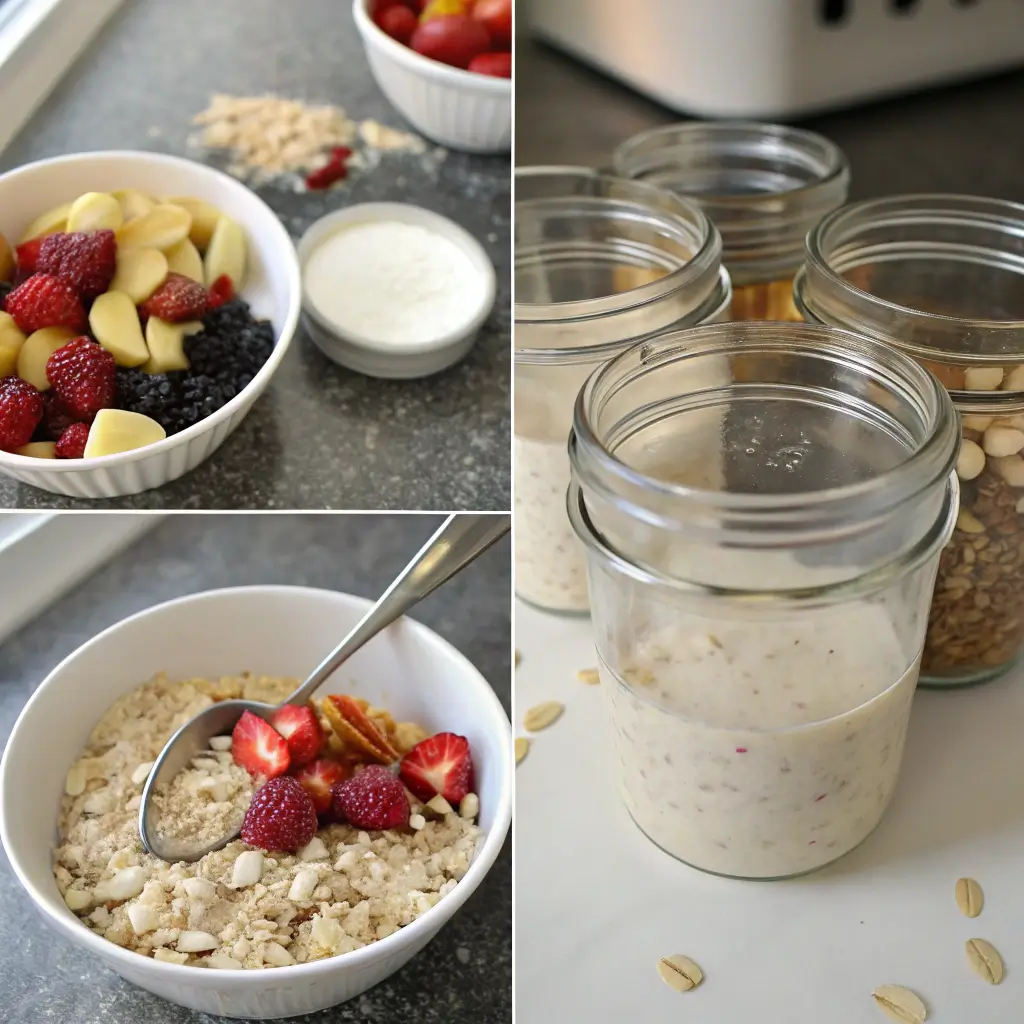Magnesium overnight oats are more than just a trendy breakfast—they’re a delicious way to meet your daily magnesium needs while enjoying a creamy, flavorful meal. By soaking oats overnight with magnesium-rich ingredients like pumpkin seeds, chia seeds, almonds, and plant-based milk, you get a balanced breakfast that’s ready the moment you open the fridge.
Not only do magnesium overnight oats save you time in the morning, but they also support better muscle health, steadier energy levels, and improved mood. Most people don’t realize that oats already contain magnesium, and with the right mix-ins, they can become a true powerhouse meal. In this article, we’ll look at how much magnesium is in oats, how to make your own magnesium overnight oats, what to avoid adding, and the health benefits you can expect.

Want more healthy breakfast inspiration? Follow us on Facebook for daily recipes and nutrition tips.
Table of Contents
Understanding Magnesium Overnight Oats
What Are Magnesium Overnight Oats?
Magnesium overnight oats are a variation of the classic overnight oats recipe with a focus on boosting magnesium levels. Rolled oats are naturally a good source of magnesium, but pairing them with seeds, nuts, and magnesium-rich fruits like bananas can make your breakfast even more nutritious.
These oats are perfect for busy mornings—you just stir, soak, and refrigerate. By morning, you have a ready-to-eat jar of magnesium overnight oats that’s both satisfying and nourishing.
Why Magnesium Matters for Your Body’s Health
Magnesium is involved in over 300 biochemical reactions in your body, from nerve function to muscle relaxation. Unfortunately, nearly half of Americans fall short of the recommended daily intake. Low magnesium can lead to fatigue, stress, and restless sleep.
Including magnesium overnight oats in your breakfast rotation is a simple way to give your body a consistent supply of this vital mineral. It’s not just a healthy choice—it’s an easy, tasty habit you’ll actually want to keep.
Do Overnight Oats Have Magnesium?
Magnesium Content in Common Oat Varieties
Yes—overnight oats do contain magnesium. In fact, rolled oats, steel-cut oats, and quick oats all naturally supply this important mineral. On average, a 100g serving of dry rolled oats provides around 177mg of magnesium, which is about 42% of the recommended daily value for adult women and 34% for adult men. That’s before adding any toppings or mix-ins.
The reason magnesium overnight oats work so well is that the soaking process doesn’t significantly reduce magnesium content. Whether you use cow’s milk, almond milk, or oat milk as your liquid, the base oats retain their minerals. And if you want even more magnesium, simply add seeds, nuts, or leafy greens into your jar.
Factors That Affect Magnesium Levels in Oats
Not all oats are created equal when it comes to magnesium. The processing method, type of oats, and even growing conditions can make a difference. Steel-cut oats, for example, retain slightly more minerals because they are less processed. Rolled oats are still a solid choice, especially for overnight oats, because they soften easily and blend well with other magnesium-rich ingredients.
Another factor is what you pair them with. For example, adding high-calcium foods like yogurt is great for bone health, but too much calcium without balancing it with magnesium may reduce absorption. That’s why recipes for magnesium overnight oats often feature nuts, seeds, or cocoa powder to ensure a balanced mineral profile.
How Much Magnesium is in 100g of Oats?
Nutritional Breakdown of 100g Rolled Oats
A 100g serving of dry rolled oats packs a surprising amount of nutrition, including a solid dose of magnesium. For context, here’s what you can expect from plain, unflavored oats:
| Nutrient | Amount per 100g | % Daily Value* |
|---|---|---|
| Magnesium | 177 mg | 42% (women) / 34% (men) |
| Calories | 389 kcal | — |
| Protein | 16.9 g | — |
| Fiber | 10.6 g | — |
| Carbohydrates | 66.3 g | — |
| Fat | 6.9 g | — |
| Calcium | 54 mg | 5% |
| Iron | 4.7 mg | 26% |
*Percent Daily Values are based on adult reference intakes.
When you make magnesium overnight oats, you’re starting with this strong nutritional foundation and enhancing it by adding magnesium-rich extras like pumpkin seeds (168 mg per ounce), almonds (80 mg per ounce), or cocoa powder (27 mg per tablespoon).

Comparing Oats to Other Magnesium-Rich Foods
While oats are a great source of magnesium, they aren’t the only one. Here’s how 100g of oats stacks up against other common magnesium-rich foods:
| Food | Magnesium (per 100g) |
|---|---|
| Rolled Oats | 177 mg |
| Pumpkin Seeds | 592 mg |
| Almonds | 268 mg |
| Spinach (cooked) | 87 mg |
| Dark Chocolate (70–85% cocoa) | 228 mg |
As you can see, oats hold their own against many high-magnesium foods, especially when combined with these powerhouse ingredients. That’s why magnesium overnight oats can easily help you reach your daily target without feeling like you’re eating “health food.”
The Best Ingredients to Boost Magnesium in Overnight Oats
Seeds, Nuts, and Plant-Based Additions
If you want your magnesium overnight oats to pack an even bigger mineral punch, start with magnesium-rich toppings and mix-ins. Seeds are some of the most concentrated sources:
- Pumpkin seeds – about 168 mg magnesium per ounce
- Chia seeds – around 95 mg per ounce
- Sunflower seeds – roughly 91 mg per ounce
Nuts are another powerhouse addition: almonds, cashews, and Brazil nuts not only add magnesium but also healthy fats and protein for satiety. Pairing oats with these ingredients creates a balanced breakfast that supports energy, muscle recovery, and heart health.
Don’t miss our Peanut Butter Protein Overnight Oats for a nutty, protein-rich version that’s also a magnesium booster.
Dairy-Free and Vegan-Friendly Magnesium Boosters
For those who prefer plant-based or dairy-free recipes, there’s no shortage of options. Unsweetened almond milk, soy milk, and oat milk often contain added minerals, including magnesium. You can also mix in cacao nibs or unsweetened cocoa powder for a rich chocolate flavor and an extra 27 mg of magnesium per tablespoon.
If you like fruit in your oats, opt for banana slices (32 mg per medium banana) or dried figs (68 mg per 100g). These not only increase your magnesium intake but also contribute natural sweetness, reducing the need for added sugar.
By being intentional with your ingredients, you can turn a simple jar of oats into a mineral-packed breakfast that keeps you full and fueled all morning.
What Not to Add in Overnight Oats
Ingredients That Reduce Nutrient Absorption
While magnesium overnight oats are a fantastic way to increase your daily mineral intake, certain ingredients can actually limit magnesium absorption. One example is excessive bran or raw spinach — both contain high amounts of phytic acid, which binds to minerals and makes them harder for your body to absorb. That doesn’t mean you need to avoid these foods entirely, but balance is key.
Too much caffeine close to your breakfast can also have a mild diuretic effect, potentially increasing magnesium loss through urine. If you’re pairing your oats with coffee, enjoy your caffeine in moderation and make sure you’re also getting enough water throughout the day.
Sugars and Additives That Harm Digestive Health
Another thing to watch for is added sugar. While sweeteners like honey or maple syrup can enhance flavor, going overboard can lead to blood sugar spikes, which may reduce overall nutrient uptake. Artificial sweeteners, meanwhile, may negatively affect gut bacteria, which play a role in nutrient absorption.
It’s also worth avoiding highly processed flavored yogurts or creamers in your magnesium overnight oats. These products often contain preservatives and fillers that do nothing for your nutrition and can crowd out space for the ingredients that truly matter—like seeds, nuts, and fresh fruit.
Keeping your oats clean and wholesome means every bite works toward supporting your health goals.
Explore more :
Here are some similar recipes related to gut brain overnight oats :
| probiotic overnight oats |
| Prebiotics and Probiotics for Digestive Health |
| nootropic morning oats |
| fermented oats recipe |
| adaptogenic overnight oats |
| electrolyte overnight oats |
Simple Magnesium Overnight Oats Recipe
Step-by-Step Preparation Guide
Servings: 2 jars
Prep Time: 5 minutes
Chill Time: 6–8 hours (overnight)
Ingredients:
- 1 cup rolled oats (provides ~177 mg magnesium)
- 2 tablespoons pumpkin seeds (~84 mg magnesium)
- 1 tablespoon chia seeds (~47 mg magnesium)
- 1 cup unsweetened almond milk (or other plant-based milk)
- ½ cup unsweetened Greek yogurt (optional, for creaminess)
- 1 medium banana, sliced (~32 mg magnesium)
- 1 tablespoon unsweetened cocoa powder (~27 mg magnesium)
- 1 teaspoon honey or maple syrup (optional, for sweetness)

Instructions:
- In a mixing bowl or large jar, combine rolled oats, pumpkin seeds, chia seeds, and cocoa powder.
- Pour in almond milk and stir until well mixed.
- Fold in banana slices and Greek yogurt, if using.
- Add honey or maple syrup for sweetness, adjusting to taste.
- Transfer the mixture into two jars, seal tightly, and refrigerate overnight.
- In the morning, give your magnesium overnight oats a stir and enjoy straight from the jar or topped with extra nuts and fruit.
Don’t forget to check out Healthy Chocolate Overnight Oats for another flavorful twist that’s rich in minerals and antioxidants.
If you love saving recipes for later, check out our Pinterest board for more overnight oats ideas and creative meal prep jars.
Variations for Flavor and Extra Nutrition
- Nut Butter Boost: Add 1 tablespoon almond butter for extra healthy fats and ~45 mg magnesium.
- Berry Antioxidant Mix: Stir in ½ cup blueberries or raspberries for a tangy, colorful addition.
- Tropical Morning: Use coconut milk instead of almond milk and top with diced mango and shredded coconut.
By adjusting the add-ins, you can make a week’s worth of jars that all taste different while still keeping magnesium levels high.
Health Benefits of Magnesium Overnight Oats
Energy, Sleep, and Muscle Support
One of the biggest perks of starting your day with magnesium overnight oats is the steady, long-lasting energy they provide. Magnesium plays a key role in converting food into usable energy, which means your breakfast is working with your body—not against it. Pairing magnesium-rich oats with healthy fats and protein from seeds or nuts also slows digestion, keeping you full and focused well into the morning.

Magnesium is also well known for its role in muscle function and relaxation. Whether you hit the gym or simply deal with daily tension, the mineral helps prevent cramps and promotes quicker recovery. If you’re active, eating magnesium overnight oats regularly may even help reduce post-workout soreness.
And let’s not forget sleep—magnesium helps regulate melatonin, the hormone responsible for healthy sleep cycles. While you may not eat your oats before bed, consistently getting enough magnesium during the day can lead to deeper, more restful sleep at night.
How It Helps Manage Stress and Mood
Magnesium has been linked to reduced levels of cortisol—the body’s main stress hormone. Low magnesium intake is associated with higher stress and even mild anxiety. By making magnesium overnight oats part of your routine, you’re giving your nervous system a steady supply of this calming mineral.
Oats also contain complex carbohydrates that help your brain produce serotonin, a “feel-good” neurotransmitter. Combined with magnesium, this can promote a better mood and a sense of calm that lasts throughout the day.
So, in just one jar, you’re tackling energy, muscle recovery, sleep quality, and stress management—making magnesium overnight oats a small habit with a big payoff.
Storage, Meal Prep, and Serving Tips
How Long Magnesium Overnight Oats Last in the Fridge
One of the reasons magnesium overnight oats are such a meal-prep favorite is their ability to stay fresh for days. When stored in an airtight container in the refrigerator, they’ll keep for up to 5 days without losing flavor or texture. If you’re adding fresh fruit like berries or banana slices, it’s best to stir them in just before eating to avoid sogginess.
For even longer freshness, store your oats and toppings separately, then combine them right before serving. This works especially well if you want a crunchy texture from nuts or seeds.
Best Containers for Freshness and Flavor
Glass jars with tight-fitting lids are the gold standard for storing magnesium overnight oats. Mason jars, for example, are durable, portable, and easy to stack in the fridge. They also make portion control a breeze—just grab a jar and go.
If you’re prepping several flavors at once, label each jar with the date and ingredients so you can enjoy them in the right order. This prevents waste and ensures you always get the freshest taste.
For busy mornings, you can even prep freezer-friendly overnight oats. Simply portion them into freezer-safe jars without the fruit, freeze, and thaw overnight in the fridge. This method keeps your magnesium-rich breakfast ready for weeks instead of days.
Common Questions About Magnesium Overnight Oats (FAQs)
Do Overnight Oats Have Magnesium?
Yes. Overnight oats naturally contain magnesium because oats themselves are a good source of this mineral. A 100g serving of rolled oats provides about 177mg of magnesium, which is around 34–42% of the daily value for most adults. When you add seeds, nuts, or cocoa powder, the magnesium content increases even more, making magnesium overnight oats a powerful breakfast choice.
Do Oats Have a Lot of Magnesium?
Compared to many grains, oats are relatively high in magnesium. They contain more magnesium per serving than rice or wheat, and when paired with other magnesium-rich foods, they can help you meet your daily requirements without supplements.
How Much Magnesium is in 100g of Oats?
One hundred grams of raw rolled oats contain approximately 177mg of magnesium. This is a significant contribution toward your daily goal, especially when combined with magnesium-rich add-ins like pumpkin seeds or almonds.
What Not to Add in Overnight Oats?
Avoid excessive added sugar, heavily processed flavored yogurts, or too much bran, as these can reduce nutrient absorption or diminish the health benefits of your oats. It’s better to stick with natural sweeteners, fresh fruit, and clean, whole-food ingredients when making magnesium overnight oats.
Conclusion
Magnesium overnight oats aren’t just another breakfast trend—they’re a smart, simple, and delicious way to boost your daily magnesium intake. By starting with oats, a naturally magnesium-rich grain, and layering in powerhouse ingredients like pumpkin seeds, chia seeds, almonds, and cocoa powder, you can create a jar that’s as nutritious as it is tasty.
From supporting energy and muscle function to improving sleep and reducing stress, magnesium plays a crucial role in overall health. And with overnight oats, getting enough of it becomes effortless—just mix, refrigerate, and enjoy.
Looking for more comforting, high-energy breakfast inspiration? Check out High Protein Vegan Overnight Oats — it’s another easy, nutritious recipe that pairs perfectly with your morning routine.
